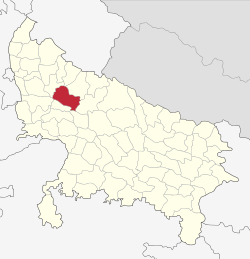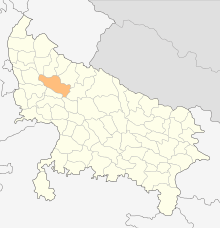Budaun district
| Budaun district बदायूँ saHSVN SAHSVNजिला بدایوں | |
|---|---|
| District of Uttar Pradesh | |
 Location of Budaun district in Uttar Pradesh | |
| Country | India |
| State | Uttar Pradesh |
| Administrative division | Bareilly |
| Headquarters | Budaun |
| Tehsils | 6 |
| Government | |
| • Lok Sabha constituencies | Badaun, Aonla (partly) |
| • Assembly seats | 6 |
| Area | |
| • Total | 4,234 km2 (1,635 sq mi) |
| Population (2011) | |
| • Total | 3,129,000 |
| • Density | 740/km2 (1,900/sq mi) |
| • Urban | 826,000 |
| Demographics | |
| • Literacy | 52.91 per cent |
| Major highways | SH33, SH43, SH51, SH18, NH 93 |
| Website | Official website |

Budaun district (Hindi: बदायूँ जिला) is one of the districts of Uttar Pradesh state of India, and Budaun town is the district headquarters. Budaun district is a part of Bareilly division. The district covers an area of 5168 km². According to the British historian George Smith, Budaun was named after Ahir prince Budh.[1]
History
The 1911 Encyclopædia Britannica wrote of Buduan: A town and district of British India, in the Rohilkhand division of the United Provinces. The town is near the left bank of the river Sot. Pop. (1901) 39,031. There are ruins of an immense fort and a very handsome mosque of imposing size, crowned with a dome, and built in 1223. According to tradition, Badaun was founded about 905, and an inscription, probably of the 12th century, gives a list of twelve Rathor kings reigning at Badaun (called Vodamayuta). The first authentic historical event connected with it, however, was its capture by Qutb-ud-din Aybak in 1196, after which it became a very important post on the northern frontier of the Delhi empire. In the 13th century two of its governors, Shams-ud-din Iltutmish, and his son Rukn ud din Firuz, attained the imperial throne. In 1571 the town was burnt, and about a hundred years later, under Shah Jahan, the seat of the governorship was transferred to Sahaspur- Bilari.
It has been noted by Prof. Goti John that this city was named "Bedamooth" (बेदामूथ) in an ancient inscription (stone writeup, शिलालेख.) (inscription at Lucknow Museum)Then this region was called Panchal (पांचाल). According to the lines on Stone Writeup there was a village "Bhadaunlak" near the city. A Muslim Historian (इतिहासकार) Mr. Roz Khan Lodhi said that here the Ashoka - The Great built a Buddh Vihar & Quila (किला) and he named it BuddhMau (बुद्धमउ). Geographically Budaun City is located near Holy River GANGA (गंगा).[2]
Economy
In 2006 the Ministry of Panchayati Raj named Budaun one of the country's 251 special funded cities (out of a total of 640).[3] It is one of the 34 districts in Uttar Pradesh currently receiving funds from the Backward Regions Grant Fund Programme (BRGF).[3]
Divisions
The district comprises five tehsils: Budaun, Bisauli, Bilsi, Dataganj and Sahaswan.
There are six Vidhan Sabha constituencies in this district: Bisauli, Sahaswan, Bilsi, Budaun, Shekhupur and Dataganj. While Shekhupur and Dataganj are part of Aonla Lok Sabha constituency, rest are part of Budaun Lok Sabha constituency.
Demographics
According to the 2011 census Budaun district has a population of 3,712,738,[4] roughly equal to the nation of Liberia[5] or the US state of Oklahoma.[6] This gives it a ranking of 71st in India (out of a total of 640).[4] The district has a population density of 718 inhabitants per square kilometre (1,860/sq mi) .[4] Its population growth rate over the decade 2001-2011 was 20.96%.[4]Budaun has a sex ratio of 859 females for every 1000 males,[4] and a literacy rate of 52.91%.[4]
A large section of its population is Muslims and Yadavs. The major urban areas In the district according to March 2015 estimates are Budaun (3.97 lacs pop.), Ujhani (1.24 lacs pop.), Sahaswan (1.18 lacs pop.) and Kakrala (0.85 lacs pop.) About 27% population of Budaun district is urban, 28% suburban and remaining 45% rural.
Major Settlements
- Badaun City
- Bharkuiyna
- Sahaswan
- Ujhani
- Kakrala
- Bisauli
- Bilsi
- Islamnagar
- Jarenda
- Dataganj
- Allapur
- Shekhupur
- Binawar
- Wazirganj
- Saidpur
- Usaihat
- Usawa
- Kuwargaon
- Faizganj
- Kachhla
- Jarifnagar
- Ramzanpur
- Dehgawan
- Gulariya
- Kurau
References
- ↑ John Murray, The student's geography of India: the geography of British India : political and physical (George Smith: 1982), p. 180
- ↑ http://badaun.nic.in/
- 1 2 Ministry of Panchayati Raj (8 September 2009). "A Note on the Backward Regions Grant Fund Programme" (PDF). National Institute of Rural Development. Archived from the original (PDF) on 5 April 2012. Retrieved 27 September 2011.
- 1 2 3 4 5 6 "District Census 2011". Census2011.co.in. 2011. Retrieved 2011-09-30.
- ↑ US Directorate of Intelligence. "Country Comparison:Population". Retrieved 2011-10-01.
Liberia 3,786,764 July 2011 est.
- ↑ "2010 Resident Population Data". U. S. Census Bureau. Archived from the original on 1 January 2011. Retrieved 2011-09-30.
Oklahoma 3,751,351
- ↑ Indian Census
External links
Coordinates: 28°07′N 78°59′E / 28.117°N 78.983°E
